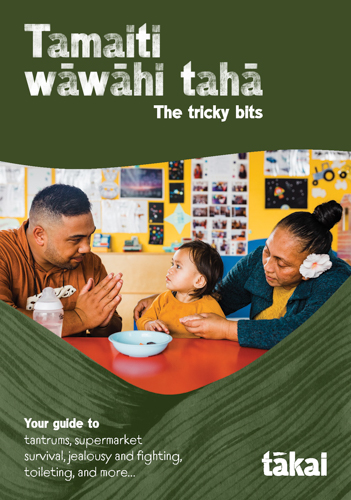
Hitting
Young tamariki are still learning how to process and express their big emotions, and this can result in lashing out. Removing them from the situation or redirecting their attention can be effective at addressing this tricky behaviour.
To manage tamariki who are hitting others, we need to first understand why they are doing it.
It’s fairly common for toddlers to bite and hit when they can’t communicate their needs and feelings. When older tamariki hit it may be because they never learnt non-aggressive ways to cope with their frustration.
Some of the reasons tamariki hit others:
- being placed in a stressful situation
- lack of routine or abrupt change in routine
- extreme frustration or anger
- unable to verbally express themselves
- over-stimulation
- exhaustion
- lack of adult supervision
- copying others.
Tamariki learn to manage their big emotions in positive ways, but they need support to do this.
What to do when it happens
Step in and support the person who has been hit. Say "we are gentle with each other."
It will be important for whānau to manage their own emotions in this too and keep calm. If the tamaiti needs support to calm down they may need a safe space and someone to help them with this.
Older tamariki (from about age 3) benefit from talking through their feelings and reasons for hitting, but only when they are calm. It’s important for whānau to acknowledge anger and frustration as normal feelings that everyone has. They could let them know that they get angry too! But they manage it by, say, letting the person who upset them know and then leaving the room until they feel less angry. Whānau can come up with healthy responses together.
It can also help to practise managing challenging situations together.
Encouraging acceptable behaviour
Whānau can remind tamariki to:
- use gentle hands, especially in situations where they might be getting frustrated and more likely to hit
- use their words rather than their hands to solve squabbles.
They can also give them specific praise when they do well. For example: "Ka pai! I like the way you asked for that toy instead of grabbing it off your sister – well done!"
Knowing a child’s limitations
Sometimes we can support tamariki who have a tendency to hit out by reflecting on the times this is occurring most often. Whānau can look for signs their child is tired or over stimulated and remove them from the situation. If their child finds new situations stressful, sticking to a routine and letting them know what’s coming up can help prevent aggressive behaviour.
Showing them how it’s done
It can be easy to forget that toddlers still have a lot to learn, and that they often learn by watching others.
Whānau can help each other by practising calming down strategies, such as taking deep breaths, and taking some time to calm down when things get heated.












